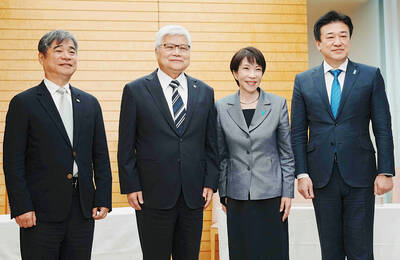An elite group of Hong Kongers voted yesterday to pick members of a committee that will choose the territory's next leader.
Pro-democracy groups hope to win enough seats in the committee to be able to nominate a candidate for the leadership race.
But few expect the vote -- which only 204,000 registered voters can participate in -- will give pro-democracy candidates control of the 800-member election committee. The panel has been traditionally composed of figures loyal to Beijing.
Nearly half -- or 373 -- of the seats have been determined because races are uncontested or the electors are appointed. However, competition is still keen with 803 candidates contesting 427 seats in 23 subsectors.
The contested seats have been allocated to professional or civic organizations representing groups such as accountants, educators, lawyers and laborers.
Elections chief Pang Kin-kee (彭鍵基) said yesterday that he expected the turnout rate to be higher than the previous election in 2000.
"I believe the election will be fiercer this time. The weather is also good today. I think the turnout rate will be higher than the 19 percent of last time," Pang said.
In the first 10 hours of voting -- until 5:30pm -- 34,804, or 17.01 percent, of the 204,000 registered voters had cast their votes. Polling stations were scheduled to close at 10pm. Results were not expected until early today.
"Today's selection of members who will represent the various subsectors of the Election Committee is the first milestone down the road to election of the next chief executive. It is therefore a very important day for Hong Kong," former No. 2 official Anson Chan (陳方安生) said in a statement yesterday.
Pro-democracy parties were backing 137 candidates that support full democracy for the territory by 2012. The pro-democracy camp was hoping that enough candidates would win seats on the panel to support its candidate, Legislator Alan Leong (

Right-wing political scientist Laura Fernandez on Sunday won Costa Rica’s presidential election by a landslide, after promising to crack down on rising violence linked to the cocaine trade. Fernandez’s nearest rival, economist Alvaro Ramos, conceded defeat as results showed the ruling party far exceeding the threshold of 40 percent needed to avoid a runoff. With 94 percent of polling stations counted, the political heir of outgoing Costa Rican President Rodrigo Chaves had captured 48.3 percent of the vote compared with Ramos’ 33.4 percent, the Supreme Electoral Tribunal said. As soon as the first results were announced, members of Fernandez’s Sovereign People’s Party

EMERGING FIELDS: The Chinese president said that the two countries would explore cooperation in green technology, the digital economy and artificial intelligence Chinese President Xi Jinping (習近平) yesterday called for an “equal and orderly multipolar world” in the face of “unilateral bullying,” in an apparent jab at the US. Xi was speaking during talks in Beijing with Uruguayan President Yamandu Orsi, the first South American leader to visit China since US special forces captured then-Venezuelan president Nicolas Maduro last month — an operation that Beijing condemned as a violation of sovereignty. Orsi follows a slew of leaders to have visited China seeking to boost ties with the world’s second-largest economy to hedge against US President Donald Trump’s increasingly unpredictable administration. “The international situation is fraught

Taiwan Semiconductor Manufacturing Co (TSMC, 台積電) plans to make advanced 3-nanometer chips in Japan, stepping up its semiconductor manufacturing roadmap in the country in a triumph for Japanese Prime Minister Sanae Takaichi’s technology ambitions. TSMC is to adopt cutting-edge technology for its second wafer fab in Kumamoto, company chairman C.C. Wei (魏哲家) said yesterday. That is an upgrade from an original blueprint to produce 7-nanometer chips by late next year, people familiar with the matter said. TSMC began mass production at its first plant in Japan’s Kumamoto in late 2024. Its second fab, which is still under construction, was originally focused on

GROWING AMBITIONS: The scale and tempo of the operations show that the Strait has become the core theater for China to expand its security interests, the report said Chinese military aircraft incursions around Taiwan have surged nearly 15-fold over the past five years, according to a report released yesterday by the Democratic Progressive Party’s (DPP) Department of China Affairs. Sorties in the Taiwan Strait were previously irregular, totaling 380 in 2020, but have since evolved into routine operations, the report showed. “This demonstrates that the Taiwan Strait has become both the starting point and testing ground for Beijing’s expansionist ambitions,” it said. Driven by military expansionism, China is systematically pursuing actions aimed at altering the regional “status quo,” the department said, adding that Taiwan represents the most critical link in China’s